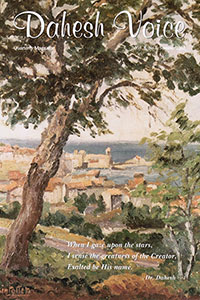
Geniuses and the Revival of Civilization
The importance of any culture is based on the strength of its pillars. Lofty religious and moral values are significant elements, but creativity in philosophy, science, literature, and art is important as well. If one of these pillars becomes weak, civilization will be affected. What could be said if most of the pillars collapse! Europe faced that for ten centuries during the Dark Ages, and the Arabs, since the fall of Baghdad in 1258. The course of world history attests to the influence of culture. Daheshism clarifies this fact, and discloses that geniuses and great creative talents are elevated spiritual fluids (energies with intrinsic intellect and tendencies), some of which may descend from paradisiacal worlds to support the teachings of prophets and messengers and to advance human civilization. However, geniuses may fall below their original, spiritual levels if they relinquished their role, and instead of adhering to their duties, they spread corruption, fail to stand by the oppressed and the weak, and recoil from striving for freedom, justice and other human rights. Their role would be reduced, then, to satisfying their self-conceit, love of fame, and earthly desires (Brax, Ar. Sec. p. 9).
Science is gaining momentum in building civilizations. In particular, its relationship to military supremacy is strengthening. The impact of this relationship has been confirmed throughout history'—people with advanced military technology and strategy were often winners in combat. This fact makes technological development a necessity in weak countries that aspire for power (Al- Araji, Ar. Sec., p. 21). However, in civilization superiority, all kinds of technology' are important. Among tire preeminent ones today is communications technology, including the
Internet. Dr. Haouili sheds light on the recent achievements in the field of university e-learning, particularly in the United States (Ar. Sec., p. 44). Furthermore, to achieve an Arabic renaissance, freedoms of belief, opinion, expression, and positive criticism should be observed, and democracy should prevail in the Arab world. Only then, problems may be dealt with in a globally integrated and scientific manner (Nashif Ar. Sec., p. 35).
Moreover, women are the cornerstone of every advanced society. How can a decrepit society rise up when in many areas, women are still ignorant and abused? However, Arabs do not lack important social reformers who call for women’s liberation (K.ik, Ar. Sec., p. 38).
In the context of civilization and the influence of the Near East on Western culture, Dr. Salem writes about the contribution of the Phoenicians to the European arts, pantheon and vocabulary (p. 10). Dr. Etrnan tells us about an old paradigm of cultural globalization in which Sicily played a successful role in forming an Arabic-European mixture of cultures, especially through the translation movement of the 12th century' (p. 6). In addition, Dr. Takrouri provides evidence that the real credit for the discovery of the pulmonary-- circulation should be given to the Syrian physician- scientist, Ibn al-Nafis (p. 19). Not to mention several other interesting articles by Dr. Kakia, Dr. Atieh, and Justice Lutfi (Ar. Sec,, pp. 78, 49, 74).
Finally, this issue of Dahesh Voice coincides with the First of June, the 93rd birthday of Dr. Dahesh. On this occasion, we present our readers with a beautiful poem addressed to him by the poet Yasser Badreddine (Ar. Sec., p. 71) along with a meditative poem (p. 4) and a fascinating short story by Dr. Dahesh (p. 26). This inspiring story lets us experience its heart-rending events in full suspense.
And since this magazine conveys the pure and bold message of Dr. Dahesh, seeking to realize some of his humane and noble goals, we cannot but give him our heart-felt thanks for illuminating the pathway which we follow, as well as for providing us with strength and perseverance in spite of the many hardships that we encounter. Our goal will always be to contribute to the revival of a humane and just civilization.
We also thank all those who contribute to this magazine and those who support it. *
The Editorial Board
